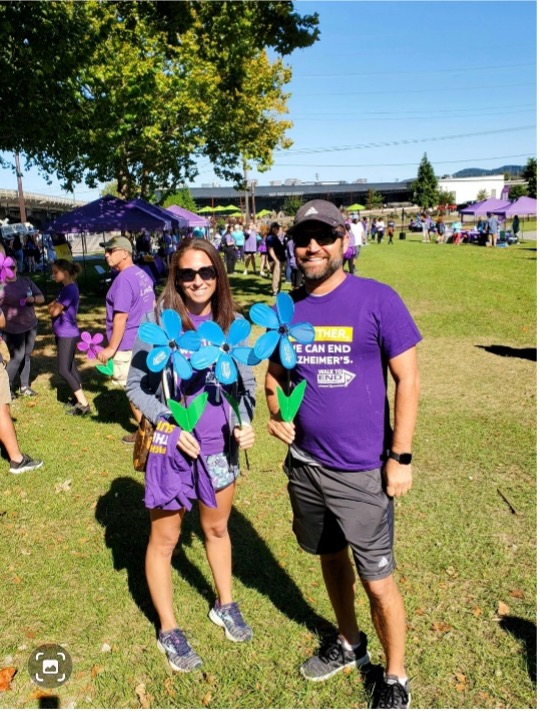When Mary Salter became a mom, she never envisioned that the bulk of her motherhood would be caring for two children with Alzheimer’s disease.
A full-time caregiver to her son Bryan, 42, and daughter Carrie, 40, Salter is part of a family that has seen their fair share of Alzheimer’s disease. Her children inherited a very rare form of Alzheimer’s from their dad, who passed from the disease a day after his 43rd birthday. Their dad was one of four brothers who passed away from Alzheimer’s disease within a span of nine years. The youngest was 37 years old.

“You see, Alzheimer’s is not just for the old,” said Salter, who recently participated in Alabama’s Advocacy Day to raise awareness about Alzheimer’s disease and the importance of supporting those living with the disease.
Caring for children with Alzheimer’s disease
Salter learned of the particular gene — Presenilin-1 — responsible for her family’s battle with Alzheimer’s disease when she and her husband started a family. And as luck would have it, each of three her children had 50-50 chance of inheriting the gene.
She later learned that two of her children — Bryan and Carrie — did indeed inherit the gene. Bryan’s illness progressed quickly, motivating Salter to fulfill his dream wish to swim with sharks. Her son has always been fascinated by the ocean and aquatic life.
“As a full-time caregiver to Bryan, I am unable to work, so funds for a trip were not in my budget,” Salter said. “I am reaching out to family, friends and strangers alike, hoping that we can raise the funds needed. Time is of the essence. You see, each day brings further memory loss and confusion.”
As part of her effort to make Bryan’s wish come true, Salter started a GoFundMe account last year. And as a gift for Christmas 2022, she “adopted” a shark for Bryan — a hammerhead named “Eddie” — through a wildlife organization.
“Hammerheads are his favorite, and he even has one tattooed on his arm,” Salter said. “Bryan is able to track Eddie in her travels in the ocean through a website called Fahlo and she is now located in the Bahamas at this time. They are hoping they can find her.”
Through the incredible generosity of people from all over the U.S., last year the Salter family raised money for a trip to the Dominican Republic with hopes that Bryan could be in the same area as Eddie.
Salter, Carrie and Bryan made the trip along with three grandchildren. The group went sightseeing, ziplining, and explored the area. Unfortunately, Eddie was not in the area.
Although disappointing, the trip was a big deal for the family.
“I am not sure how much time we have left,” Salter said. “Alzheimer’s does not ask permission. It just comes in and takes what it wants, when it wants.”
In addition to the “once-in-a-lifetime trip,” both Bryan and Carrie have been participants in a clinical trial for a new Alzheimer’s treatment drug. Carrie began the trial nine years ago, while Bryan was first denied because of some underlying liver enzyme issues. Once those were resolved, he entered the trial.
Even though the clinical trial is a “blind” trial, the results witnessed by Salter for both of her children couldn’t be more different. Salter believes that Carrie received the “live” drug, as she is still able to work and drive. Bryan, however, has slowly progressed in his diagnosis, no longer able to do daily tasks such as dressing and showering without some assistance.
Salter, heartbroken by her son’s progress, continues to work to educate herself about the disease and prepare herself for the foreseeable future. She also struggles to find engaging activities for Bryan in hopes of making his life more enjoyable.
Salter knows she needs to reach out for support for herself, too.
Salter admittedly says she “feels like a failure.” But motherhood has come full circle for her by caring for Bryan and Carrie as she cared for them when they were young.
Salter said she is doing what every mother would: hold fast to their dreams and hopes for a cure.
This article was contributed by the Alzheimer’s Association – Alabama Chapter.


